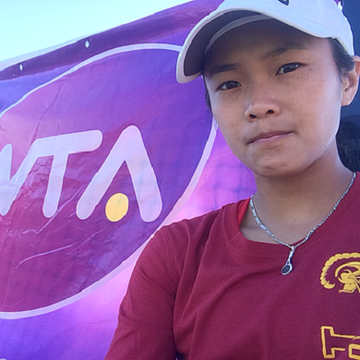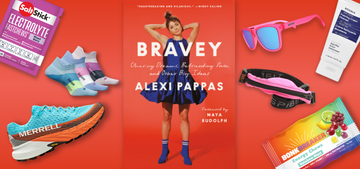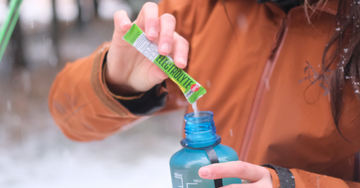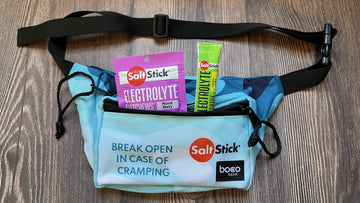SaltStick
SaltStick-Sponsored Tennis Player Danielle Lao: Achieving Success Through Relentless Dedication
Aug 08, 2016

 At SaltStick, we are proud to sponsor top athletes in the fields of triathlon, running, tennis and more. We are inspired by our athletes and admire the hard work and time they have dedicated to achieving success.
Because we hope our athletes’ performances will serve as motivation as you pursue your own fitness and life journey, we enjoy sharing their stories. This week’s blog post features professional tennis player Danielle Lao, a California native who reminds us that hard work and relentless dedication always pays off.
Danielle is a world-class professional tennis player, and her achievements include a top-300 Women’s Tennis Association (WTA) player ranking and multiple 25k and 15k championship wins.
For other athletes’ stories, visit any of the blog posts below:
At SaltStick, we are proud to sponsor top athletes in the fields of triathlon, running, tennis and more. We are inspired by our athletes and admire the hard work and time they have dedicated to achieving success.
Because we hope our athletes’ performances will serve as motivation as you pursue your own fitness and life journey, we enjoy sharing their stories. This week’s blog post features professional tennis player Danielle Lao, a California native who reminds us that hard work and relentless dedication always pays off.
Danielle is a world-class professional tennis player, and her achievements include a top-300 Women’s Tennis Association (WTA) player ranking and multiple 25k and 15k championship wins.
For other athletes’ stories, visit any of the blog posts below:
- Life as a Professional: Get to Know SaltStick-Sponsored Athlete Drew Scott
- Everything You Wanted to Know About Professional Triathlete Lauren Goss
- Ultrarunner Michelle Barton: Her Running Story, Training Advice, and How She Stays Motivated
- Why SaltStick Partner Brian Hackenburg Races Marathons in 46 Pounds of Firefighter Gear to Raise Fitness Awareness
- Sponsored Athlete Katie Spotz: Nutrition, Motivation and Endurance Sports for a Greater Cause
Danielle’s journey into tennis:
Although Danielle is currently ranked among the top 250 tennis players in the world, her initial path into sport actually started as a golfer. Beginning at age 4, Danielle trained for the greenways, and three more years passed before she discovered tennis on a family vacation at age 7. For several additional years, she participated in both sports, although tennis slowly replaced golf as her first love. “- Top 300 WTA Player
- 25k & 15k Singles Champion
- #261 WTA Singles Career High Ranking
- #221 WTA Doubles Career High Ranking
- USC Women’s Tennis Team Captain
- 2x NCAA DI Singles All American
On training:
“I am always impressed with how the best tennis players in the world are evolving into better athletes,” Danielle says. “The new exercise and training regiments blow my mind.” Many readers of our blog are involved in endurance sports and thus are no strangers to long hours in the gym or on the road. However, Danielle’s training regimen is extraordinary: During peak times of the year, she trains up to four and a half hours per day for six days a week. Tennis matches involve sprinting, dodging, leaning, scooping, and a myriad of other moves in all planes of direction -- often times in the heat of the day. In order to perform optimally, Danielle practices technique and matchplay for up to three hours a day, sometimes with an added 1.5 hours of track work for conditioning. “I believe the sport is a lot more physical than people make it out to be,” Danielle says. “The amount of attention players put into conditioning their bodies to be better athletes is really overlooked. The sport has evolved to be so dynamic that we are all constantly trying to look for the perfect balance between mobility, power, and strength.” For Danielle, competing involves a mix of physical and mental stamina, as well as an attention to detail. She routinely works on her technique with a coach so that it doesn’t preoccupy her focus when the pressure heats up.On motivation:
“Every athlete has off days and mornings when they wake up not feeling 100% into it,” Danielle says. “Although I would prefer not to have these days, they are pivotal to finding out who you are.” Danielle uses off days as a method to finding her foundation in the sport. “You always have to go back to the basics when you are a little lost,” she says. “Seeing where you are drawn to on bad days reminds you who you are and how you got to be this good. In the process of getting yourself back to good form, it’s always important to assure yourself that better moments are ahead of you if you can just work through this temporary struggle.”On nutrition:
Regarding nutrition, Danielle says balance is key. “I primarily have more protein and vegetables in my diet, but I never strictly cut anything out,” she says. “I listen to my body. If I feel it needs more energy, I adjust with adding a little more carbs in my meals. If I feel I am losing strength and power, I’ll bump up my meats a bit.” https://twitter.com/TheLittleGiant/status/713539086435401728 What’s her favorite post-workout meal? “After a tough day, I love a nice sirloin with some sweet potatoes,” Danielle says. Danielle is also a big proponent of staying hydrated, despite a rigorous travel schedule. This is important for athletes and non-athletes, alike. When we travel, we are particularly susceptible to dehydration, for a few reasons:- First, our routines are broken up, so we may not instinctively drink enough water or consume similar foods that would normally keep us hydrated.
- Second, humidity levels inside planes are extraordinarily low, which is naturally dehydrating — especially if we also consume alcohol or caffeine.
- Finally, if the trip includes outdoor activity, such as hiking or water sports (or, in Danielle’s case, a tennis match), travelers will lose water and electrolytes through sweat.








